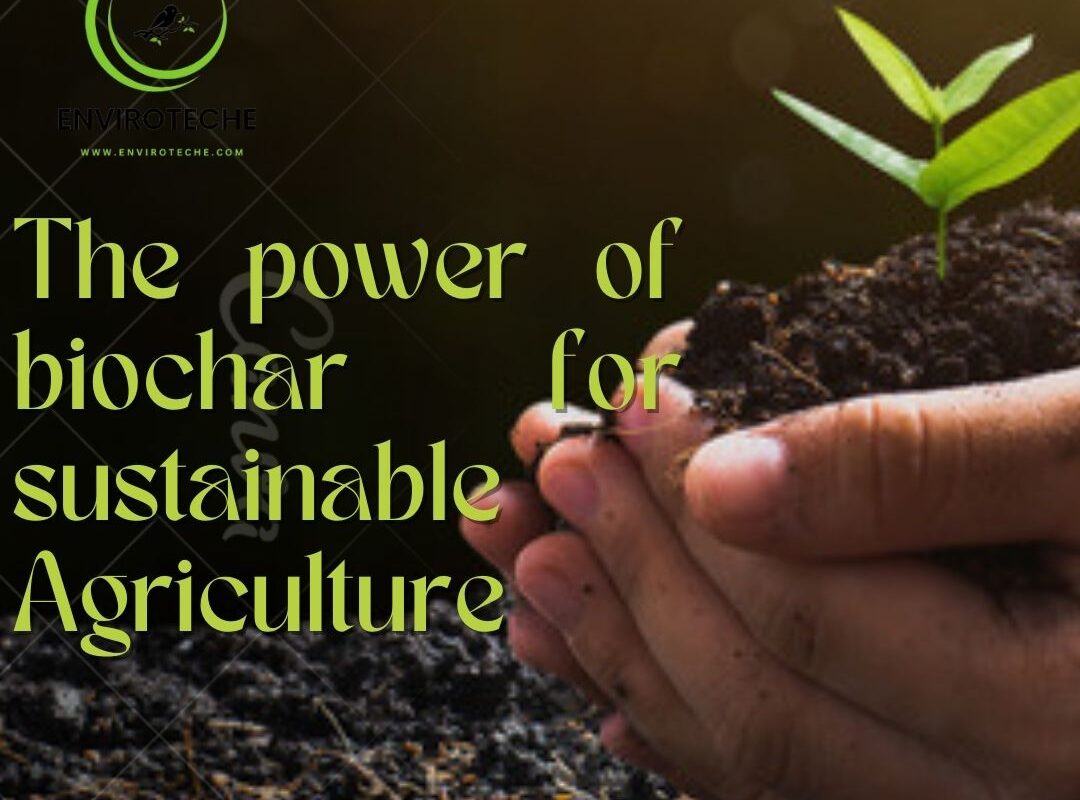
Biochar
Biochar a substance that has been used for centuries is gaining recognition as a revolutionary tool in agriculture. Derived from the carbonization of organic matter biochar is a highly porous form of charcoal that can significantly enhance soil fertility. Its unique properties make it a valuable addition to any farming system with benefits ranging from improved water retention to increased nutrient availability. In this article, we will delve into the science behind biochar and explore its impact on soil health.
What are the Benefits of using biochar in Agriculture?
The use of biochar in agriculture offers a multitude of benefits. Firstly biochar acts as a sponge capable of retaining water and nutrients in the soil. This not only reduces the need for frequent irrigation but also prevents nutrient leaching, ensuring that plants root have access to a steady supply of essential elements. Additionally, the porous structure of biochar provides a habitat for beneficial microorganisms fostering a healthy soil ecosystem. These microorganisms aid in nutrient cycling disease suppression and overall plant growth.
Furthermore, biochar has the incredible ability to enhance soil fertility over the long term. Its unique structure promotes the sequestration of carbon in the soil mitigating climate change by reducing greenhouse gas emissions. This carbon sequestration also enriches the soil improving its overall quality and enhancing its capacity to support plant growth.
Biochar Production Methods and Consideration
The Production of biochar involves the carbonization of organic waste materials such as agriculture residues or woody biomass. There are various methods available for producing biochar each with its own advantages and consideration. Pyrolysis involves heating organic matter in the absence of oxygen while gasification involves the partial combustion of organic matter. Carbonization on the other hand is a slower process that involves heating organic matter at lower temperatures.
When considering biochar Production it is important to select the appropriate method based on desired end product and available resources. Factors such as temperature heating time and feedstock composition can impact the properties of the resulting biochar.
How to incorporate biochar into your soil
Incorporating biochar into your soil is a straightforward process that can yield remarkable results. The first step is to determine the appropriate application based on soil type crop requirement and desired outcome. It is recommended to start with a small amount and gradually increase the application rate over time. This allows for observation of how the biochar interacts with the soil and plant.
Once the application rate is determined can be mixed into the soil using various techniques. One common method is to till or low the biochar into the layer of soil. Alternatively, biochar can be applied as a top dressing.
Case studies
Successful implementation of biochar in Agriculture: The Amazonian terra preta
Our first case study takes us deep into the heart of the Amazon rainforest where the indigenous people have long been practicing a sustainable farming technique known as terra reta. The presence of terra preta not only enhances soil fertility but is also important for its water-holding capacity and nutrient retention. This remarkable example showcases the immense potential in transforming barren lands into thriving agricultural havens.
Biochar in Modern Farming Practices
While the ancient wisdom of the Amazonian people has paved the way for recognition modern agriculture practices have also embraced its benefits. In the United States, its use in vineyards has shown promising results.
Biochar in organic farming
Its role in organic farming practices cannot be overlooked. Organic farmers driven by the desire to minimize their environmental impact have turned as a natural solution to enhance soil fertility. The addition to organic farms has been found to improve nutrient cycling reduce greenhouse gas emissions and promote the growth of beneficial soil microorganisms.
Biochar and Traditional fertilizer
When it comes to enhancing soil fertility traditional fertilizers have long been the go-to choice for farmers. However, it offers a compelling alternative with numerous advantages.
Nutrient Retention and slow release
One of the primary benefits, is its ability to retain nutrients and release them slowly over time, unlike traditional fertilizers which can leach into water bodies and cause pollution. It acts as a reservoir holding onto essential nutrients and preventing them from being wasted away by rain or irrigation. This slow-release mechanism ensures that plants receive a continuous supply of nutrients.
Carbon sequestration
It not only beneficial for soil fertility but also plays a crucial role in migrating climate changes. Produced through the process of pyrolysis looks away carbon that would otherwise be released into the atmosphere. By sequestering carbon in the soil for hundreds or even thousands of years, it has the potential to significantly reduce greenhouse emissions. This dual role as a soil amendment.
Soil structure and Water Retention
Another advantage of biochar is its ability to improve soil structure and water-holding capacity. The porous nature creates a habitat for beneficial soil microorganisms, allowing them to thrive and contribute to the overall health of the soil ecosystem. Additionally, it acts as a sponge absorbing excess water during periods of heavy rainfall and gradually releasing it during dry spells. This property helps to prevent soil erosion, reduce water runoff and ensure that plants have access to water.
Misconceptions about Biochar and soil fertility
Despite its numerous benefits, it has faced its fair share of misconception. Let’s address some common misconceptions and shed light on the truth surrounding role in soil fertility.
Biochar Acidifies the soil
One of the prevalent misconceptions about biochar is that it acidifies the soil making it unsustainable for certain plants. While it is true that some types of it can have a slight biochar derived from alkaline materials. Additionally the long-term benefits, such as improved nutrients.
Biochar is expensive and difficult to produce
Another misconception surrounding is that it is expensive to produce and challenging to implement on a large scale. While the initial cost production equipment may seem daunting, the long-term cost-saving outweighs the initial investment. Moreover, it can be produced using agricultural waste material, such as crop residues.
Biochar is a magic bullet for soil fertility
It offers remarkable benefits for soil fertility, it is essential to recognize that it is not a cure-all solution. It should be used in conjunction with other sustainable. Agriculture practices, such as crop rotation cover cropping and organic fertilizers, to maximize its effectiveness.
Environmental Benefits of using Biochar in agriculture
Carbon sequestration and climate change mitigation
As mentioned earlier, it has the unique ability to sequester carbon in the soil effectively removing it from the atmosphere. This process helps mitigate climate change by reducing the concentration of greenhouse gases. By incorporating it, into agriculture practices we can actively contribute to carbon dioxide and work toward a more sustainable future.
Reduced water Pollution
Unlike traditional fertilizer, which can leach into water bodies and contribute to water pollution, it acts as a filter preventing the release of harmful substances into the environment, we can minimize the pollution of rivers, lakes, and oceans safeguarding aquatic ecosystems and preserving biodiversity.
Conclusion
As we conclude this exploration into the revolutionary role in soil fertility it is clear that this ancient technique hold the immense Potential for modern agriculture. Through successful case studies we have witnessed the transformative impact on barren land, vineyard, and organic farms. By comparing it to traditional fertilizer we have established advantages in nutrient retention carbon sequestration and soil structure improvement we have also debunked common misconception and highlighted the environmental benefits of biochar implementation.
It is now up to us the steward of the land to embrace this nature secret weapon and unlock it full potential. By harnessing the power we, can create a sustainable future where soil fertility is enhanced carbon is sequestered water pollution is reduced and ecosystem thrive. Let us embark on this journey together and pave the way for a greener and more prosperous tomorrow.
Authors detail:
Khadija Azhar1, Sania tahir1
1Department of Environmental Sciences, Government College University Faisalabad
Check Other Schlorships:




